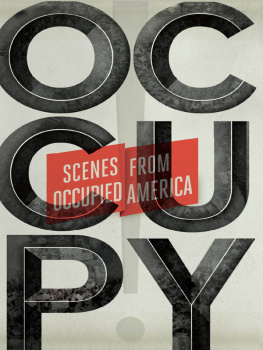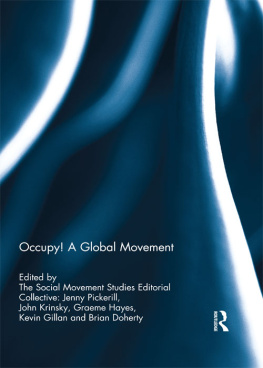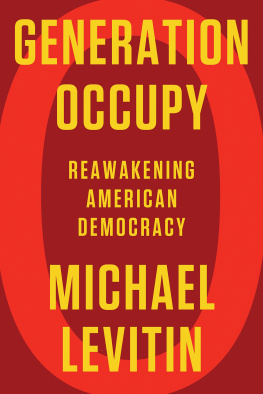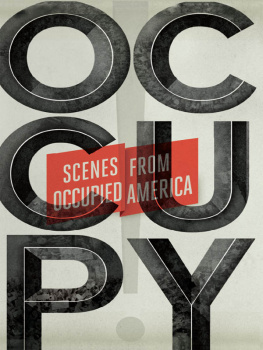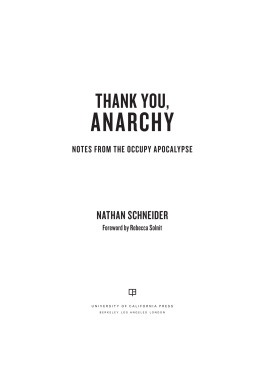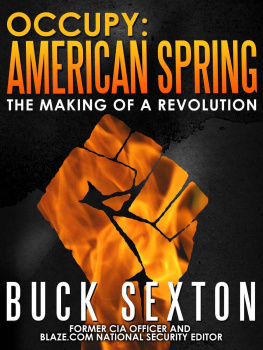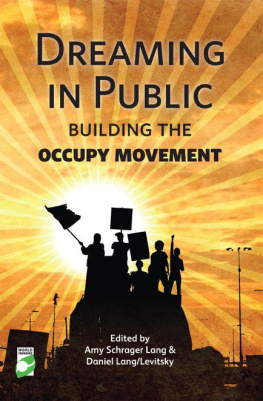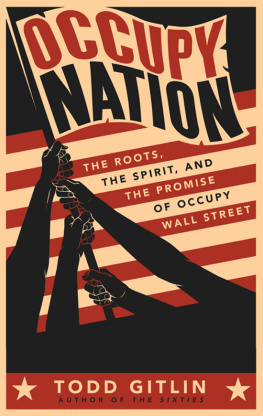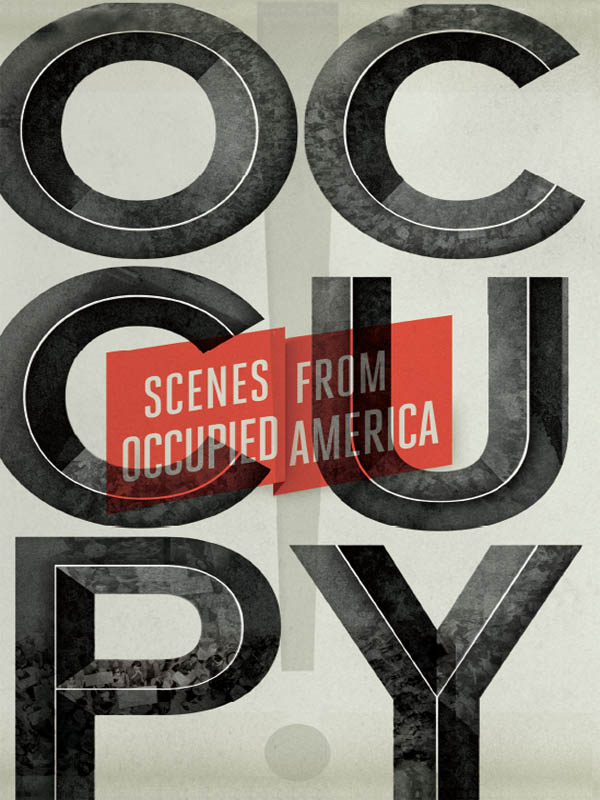OCCUPY!
V
VERSO
This edition first published by Verso 2011
Featuring content from Occupy! Gazette
The collection Verso 2011
Individual contributions The contributors 2011
All rights reserved
The moral rights of the authors have been asserted
1 3 5 7 9 10 8 6 4 2
Verso
UK 6 Meard Street, London W1F 0EG
US: 20 Jay Street, Suite 1010, Brooklyn, NY 11201
www.versobooks.com
Verso is the imprint of New Left Books
N+1
68 Jay Street, Suite 405, Brooklyn, NY 11201
www.nplusonemag.com
ISBN-13: 978-1-84467-940-9
ebook ISBN-13: 978-1-84467-941-6
British Library Cataloguing in Publication Data
A catalogue record for this book is available from the British Library
Library of Congress Cataloging-in-Publication Data
A catalog record for this book is available from the Library of Congress
Layout and typography by Rumors
Printed in the US by Maple Vail
OCCUPY!
SCENES
FROM
OCCUPIED
AMERICA
Edited by Astra Taylor, Keith Gessen, and editors from n+1,
Dissent, Triple Canopy and The New Inquiry
PREFACE
The genesis of this book is that we were lucky enough to be in New York, and in America, at the start of the occupations of public ground that began in September 2011. We started as participant-observers. None of us thought this protest would be anything bigger than others we had joined. As time went on, we became observers more explicitly. Something was unfolding, which was becoming one of the most significant and hopeful events of our lifetimes.
We started with what we know how to do. We wrote, we got our friends to write, we edited, and we compiled. Soon we had a broadsheet newspaper, a sort of living document that we distributed for free around the city and online. Our first two OWS-inspired Gazettes formed the basis of this book.
The diaries come through our eyes, with inevitable traces of the ways we see and think and dream. Like all documentation of the movement, there is nothing official about this record. The essays represent other views we solicited, ideas we sought, speeches we heard, and ephemera we asked to print from the ever-changing flow of the internet. As the weeks went on, we realized we wanted to leave something for the future to hold, a prism to put to the lamp of the event, just as every occupation casts a blaze of light in darkness.
As this book went to press, during what seems to be part of a crackdown on occupations across the country, Zuccotti Park/Liberty Plaza was raided. Following the example of police in other cities, the NYPD entered the camp under cover of night and evicted all the residents, confiscating tents, sleeping bags, and books, and pepper-spraying and arresting protesters. In response to these attacks, occupiers posted a message online. You cant evict an idea whose time has come, it began. Rebecca Solnit put it more poetically: You can pull up the flowers, but you cant stop the spring.
The movement and this book are not over. We will continue writing updates and analyses on the Occupy! Gazette website.
Astra, Eli, Nikil, Sarah R, Sarah L, Mark, Keith, Carla
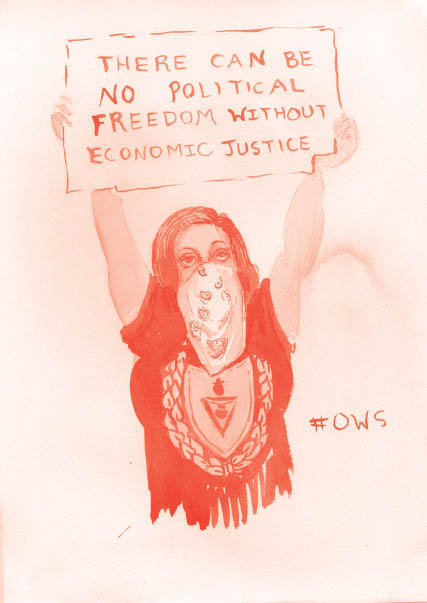
Illustration by Molly Crabapple
SCENES
FROM AN
OCCUPATION
ELI SCHMITT, ASTRA TAYLOR
& MARK GREIF
Saturday, September 17
Eli:
When I got off the train in the Financial District last Saturday, the first thing I did was accidentally walk into a policeman. He and fifteen or so other policemen were standing in front of a barricade that had been set up to prevent anyone from entering Wall Street. As I backed away, flustered, I heard one member of a passing elderly couple say to the other, pointing between two buildings, Is that the Freedom Tower going up over there?
I had come to the Financial District for a gathering of leftist dissidents, an event that had been described to me as an occupation of Wall Street. There were a few websites explaining that For #occupywallstreet, dispersion is part of the plan and informing protesters that they do not need a permit to occupy or peaceably assemble on public sidewalks. Emails and blog posts alluded to the Supreme Court decision in Citizens United, popular uprisings in the Middle East, and the intense clout of financial institutions. The tone of the pieces varied, but all shared a sense of indignation. The event seemed to be predicated on the idea that the act of assembling was threatened, that the gathering was a justification of itself.
I had trouble finding this gathering, however, since Wall Street itself had been shut down. Chase Manhattan Plazathe designated meeting placewas surrounded by police barriers. At the barricades, I didnt see any protesters, only tourists having their pictures taken with cops and tourists having their pictures taken by cops. It was only 3:30 PM but it felt like dusk. As I walked, I came to suspect that there were no dissidents at all, that any organized group action had been squelched by the hundreds of police guarding the narrow passageways between the skyscrapers.
Finally, a friend responded to my text message and told me where to find the General Assembly. The group had congregated in Zuccotti Park, at Liberty Plaza, a paved rectangle between Broadway and Trinity Place, and looked to be at least a few hundred strong. Instead of a single, unified congregation, there were smaller circles of ten to fifty people, some with megaphones. Some circles had moderators and agendas, others appeared to be more spontaneous. Speakers took turns sharing their thoughts and suggestions: how we should be respectful to the police (fuck the police, love the police officer), how cronyism was destroying our democracy. Peoplesome compelling, others less sourged one another to storm Wall Street, shared information about where to find food and blankets, and decried the Obama administration. Around the edges of the park, rows of police officers and large groups of protesters milled about.
Astra:
The first day I arrived and surveyed the scene, I was totally dispirited: same old, same old, and not very substantial. Since the authorities had locked down the area in anticipation of the days events, demonstrators were dispersed and outnumbered by police. But then I followed an impromptu procession into the park where they are now encamped. I hooked up with a group of friends and we had an assembly with a bunch of strangers and talked economics for two or three hours. It was kind of nice to be at a protest and, instead of marching and shouting, to be talking about ideas. It felt like the script had changed. As 7 PM approached, my friends and I left thinking the cops would clear everyone out in no time. When they made it through the night I began to give them more credit.
Mark:
It was a nice day. I came to meet a couple of friends, and we ran into people we knew distantly, met up with Astra and her friends, and then ran into people from Dissent and from The New Inquiry. We joined up, sat down, and did what the organizers asked, which was to discuss which proposals or demands were most important to us, for this collective gathering. These would be put to the General Assembly for public discussion, so this large group of strangers could determine its purpose. Our circle attracted more visitors and strangers.
After a series of votes and debates, we concluded that the desire that brought most people in our group together was this: to restore government to citizen control, to regulate finance for the common good, and to get banks out of the business of buying legislators and influencing law. We talked about debt and mortgage relief and the destruction of Glass-Steagall and McCain-Feingold, and what it would take to save their purpose. Wed need the countrys agreement that freedom of speech belongs only to living citizens, not corporationsto overturn the

